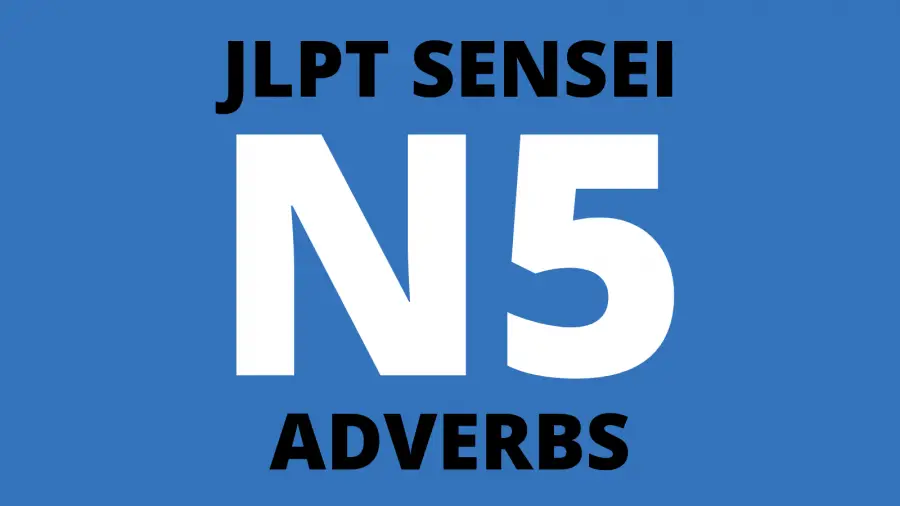This is a complete list of beginner Japanese adverbs that you must know in order to pass the JLPT N5.
Adverbs are words that modify other words (verbs, adjectives, other adverbs, and even full sentences).
In Japanese, adjectives can be turned into adverbs by adding に (ni) at the end. This is similar to the English ‘ly’, as in quickly.
- PDF download of this page. (for members only)
- See full adverbs list for all JLPT levels.
- See all N5 vocabulary.
JLPT N5 Adverbs Complete Study Guide
| # | Romaji | Japanese | Grammar Meaning | Level |
|---|---|---|---|---|
| 1 | chotto | ちょっと | a little | N5 |
| 2 | choudo | 丁度【ちょうど】 | exactly | N5 |
| 3 | daijoubu | 大丈夫【だいじょうぶ】 | OK; okay; alright; problem free | N5 |
| 4 | dandan | だんだん | gradually | N5 |
| 5 | dou | どう | how; in what way; how about | N5 |
| 6 | doumo | どうも | thank you; thanks | N5 |
| 7 | doushite | どうして | why; for what reason; how | N5 |
| 8 | douzo | どうぞ | please | N5 |
| 9 | hajimete | 初めて【はじめて】 | for the first time | N5 |
| 10 | hitori | 一人【ひとり】 | one person; alone; single | N5 |
| 11 | ichiban | 一番【いちばん】 | number one; first; 1st, first place; best; most | N5 |
| 12 | ikaga | いかが | how; in what way; how about | N5 |
| 13 | ikura | いくら | how much?; how many? | N5 |
| 14 | ikutsu | いくつ | how many?,how old? | N5 |
| 15 | iroiro | 色々 【いろいろ】 | various | N5 |
| 16 | issho ni | 一緒に【いっしょに】 | together | N5 |
| 17 | itsumo | いつも | always; usually; habitually | N5 |
| 18 | kekkou | 結構【けっこう】 | splendid, enough | N5 |
| 19 | mada | まだ | still; not yet | N5 |
| 20 | mada ~te imasen | まだ~ていません | have not yet ~ | N5 |
| 21 | mae ni | 前に【まえに】 | before; in front of ~ | N5 |
| 22 | massugu | 真っ直ぐ【まっすぐ】 | straight ahead,direct | N5 |
| 23 | minna | みんな | all; everyone; everybody | N5 |
| 24 | motto | もっと | more; longer; further | N5 |
| 25 | mou | もう | already; anymore; again; other | N5 |
| 26 | naze | 何故【なぜ】 | why; how | N5 |
| 27 | onaji | 同じ【おなじ】 | same | N5 |
| 28 | sugu ni | 直ぐに【すぐに 】 | immediately; right away; instantly | N5 |
| 29 | sukoshi | 少し【すこし】 | a little (bit); small quantity; few; short distance | N5 |
| | ||||
| 30 | tabun | 多分【たぶん】 | perhaps; probably | N5 |
| 31 | taihen | 大変 【たいへん】 | very; greatly; terribly; serious; difficult | N5 |
| 32 | tokidoki | 時々【ときどき】 | sometimes; at times | N5 |
| 33 | totemo | とても | very; awfully; exceedingly | N5 |
| 34 | yoku | よく | often, well | N5 |
| 35 | yukkuri | ゆっくり | slowly | N5 |
Total JLPT N5 Adverbs Lessons (35)
Page 1 of 1

